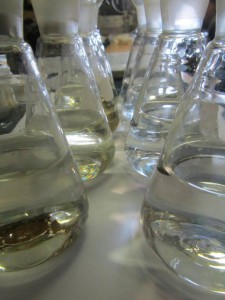
Design of experiment – why?
This is a skill we need to learn a lot more systematically than we currently do!
I have recently started working on a small teaching unit on the design of experiments. And I realized that the training that I received on that matter was really not sufficient and I am pretty sure that’s the same for most people in my field.
Imagine, for example, you were at sea. You were running a common procedure to measure something, but you noticed that a color change was happening that was not supposed to be there. What would you do?

See the yellow tint in the flasks on the left side? Yep, it’s not supposed to be there, it’s supposed to be completely clear.
In a first step, you might just repeat what you just did to see whether it is going to happen again (which, allegedly according to Einstein, is a sign of your madness). Not that it not happening would be telling you anything at all about what caused the color change in the first place, but still. So then let’s say it were to happen again. What would you suspect could cause this reaction that should not be happening? It could be that you didn’t rinse the flasks properly so that you are contaminating your sample. Or it could be that the distilled water which you are taking from a dubious apparatus on the wall isn’t quite distilled (after all you can see stuff growing in the tubes on the downstream end of the actual distillation, so you might reasonably have your doubts). Or that the micropore filter is not doing a good job any more. Or that your reagents are contaminated. Or that you contaminated your reagents yourself with a contaminated pipette you used. Or that the lab on this ship was previously used for something that is now contaminating your samples. At the same time you start wondering how robust an indicator the color change is. If you don’t see it, does it mean that the reaction that causes it has not happened? And how could you be sure of that without adequate lab equipment?
How would you proceed in order to figure out what exactly is causing this color change that isn’t supposed to be happening? I learned this lesson the very very hard way: You need to have a good plan in place of how to figure out where exactly a problem is.
So now I am very excited to be working on how to teach exactly this skill. Because it is just that: there are methods you can apply to systematically figure out what is wrong. People who find themselves on such a doomed cruise (or even in a doomed lab) need not not panic, not just randomly exchange reagents or vessels, pipettes or distilled water, but just remember to figure out what all possible variables are, and then follow the procedure.
Stay tuned! :-)